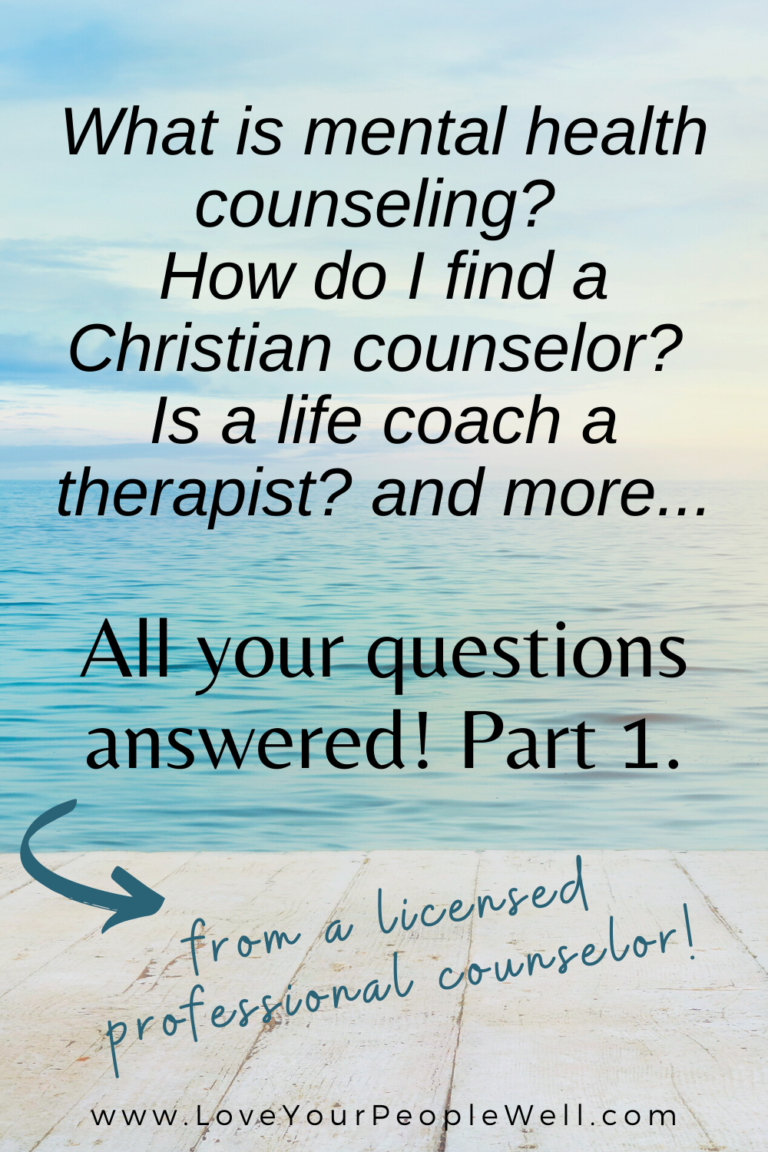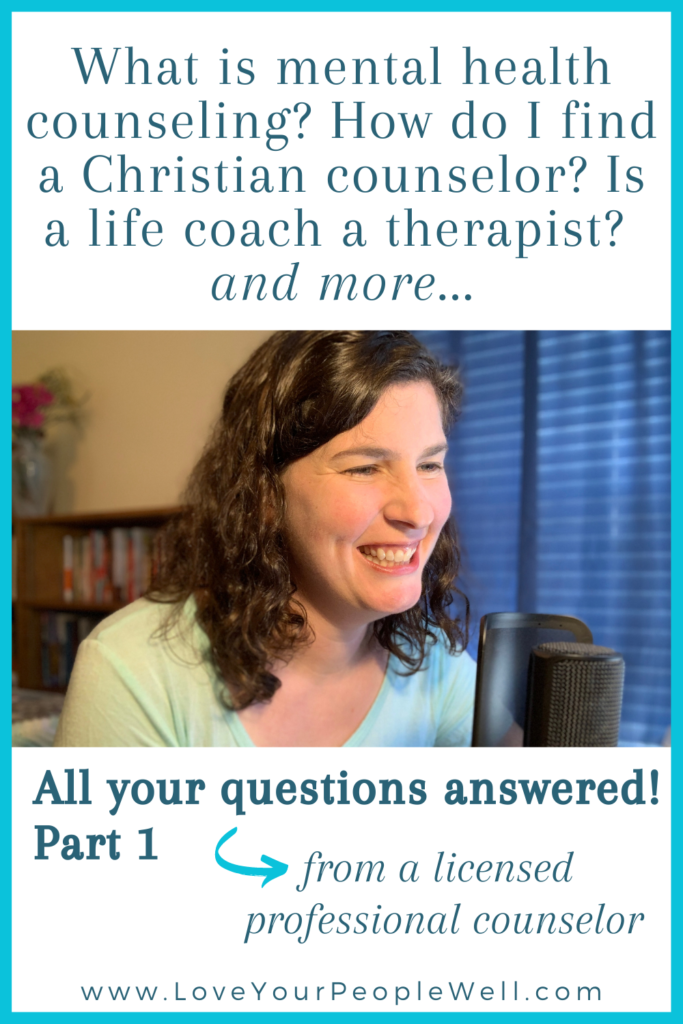What are we talking about today?
Counseling can raise a lot of questions for us. Should Christians go to counseling? What is a life coach? Is therapy the same thing as counseling? Do I need counseling? How do I find a great therapist?
We are tackling these questions in a two-part series. My goal is to build your comfort and confidence in thinking about the counseling process. I am a licensed therapist and I’m excited to dive into these questions with you!
Today is part 1 and we are looking at:
- when counseling may be helpful for you,
- the different types of professionals available, and
- how Christians should think about counseling.
In part 2, we will look at my recommendations for how to find a great counselor as well as discuss what to expect if you are starting counseling.
I’ve got a thorough summary below so that you can still get all the details if you prefer to read rather than listen… but, as usual, you’ll get the most out of this episode if you pop in those earbuds and hit play!
Let’s dive in, friend.
Listen to Episode 32:
Part 2 will go live on Friday, August 27, 2021.
[This post may contain affiliate links. If a purchase is made, I may receive a small commission at no extra charge to you.]
Snag your resources here!
I have several FREE resources that may be helpful to you as you consider your mental health, emotional wellness, and the possibility of professional support.
- Sign up for my free 5-day email course and (in only 10 minutes a day!) learn the 5 Tools Every Busy Mom Needs to Move Her Family From Autopilot to Intimacy.
- Grab a copy of your free Conflict Resolution Checklist.
- Check out the 51 Self Care Ideas List.
- Strengthen your spiritual growth with the Holy Habits: 45 Day Prayer & Bible Challenge.
My Recommended Resources page will also be very helpful, especially if you have thought about counseling for a particular struggle. Books are a fabulous starting place for ideas, help, and healing, and I have links to all of my favorites that I recommend frequently in the counseling room.
As I mention in the podcast episode, mental health emergencies and serious safety issues should be taken seriously. Contact your local emergency room or police for help. The Suicide Prevention Lifeline number is 1-800-273-8255 or you can chat with them online at https://suicidepreventionlifeline.org.

[This post may contain affiliate links. If a purchase is made, I may receive a small commission at no extra charge to you.]
Today's Episode Highlights
Let me start with a disclaimer. I am a licensed therapist, but this podcast episode (and all resources from Love Your People Well LLC) are informational, not professional counseling or personal advice. (Read my disclaimer policy here.)
Also, I am sharing this information from my personal experience as a licensed mental health therapist in the United States! If you are from outside the States, you may have a different process in seeking help in the mental health world. Even the different states within the U.S. sometimes have different processes. So, if you are seeking counseling for yourself, you may find your local process a little bit different.
When should I consider seeking counseling?
If you are thinking about seeking professional help, you are not alone! Hundreds of thousands of people seek counseling each year. It takes courage, vulnerability, and personal work to start the counseling journey.
Let me outline the 5 most common situations when I see people start the counseling process (or at least consider it).
Before I share those situations though, please note that it is not at all required that you get professional counseling in order to find help, hope, and healing if you find yourself in one of these situations!
God can bring healing in many different ways. Yes, I’ve seen the counseling process be a big part of that for many people. But if you decide not to get counseling, that is not a failure on your part! It is not a requirement for healing.
(You’ll get the most value from listening to the full podcast episode.)
The 5 most common situations that I see bringing people to counseling are:
- When people find themselves facing unexpected and difficult life circumstances or relationship circumstances. This might include grief after the death of a loved one or finding out a spouse has been unfaithful.
- An emotional or relationship struggle (which may or may not be linked to a specific event, like the situation above). This would include things like trying to cope with anxiety, loneliness, relationship conflict or poor communication patterns. (Or plenty more!)
- Receiving the diagnosis of (or concern about) a mental illness. Or, starting medication for a mental health diagnosis. For many diagnoses, a combination of medication and “talk therapy” are most effective together.
- When someone needs to heal from abuse, trauma, or other difficult life history. This might be current or in the past! Deep emotional healing often leads people to seek professional support.
- Struggling with risky behaviors, thoughts, or emotions. This may include addiction issues, self harm behaviors, or suicidal thoughts or actions. *Please note, if a suicide concern is current and active, don’t take time looking around for counselings – call your local emergency supports! In the U.S. this means call 9-1-1- or go to your nearest emergency room. You can also access the Suicide Prevention Lifeline 24/7 at 1-800-273-8255, or chat with them online at https://suicidepreventionlifeline.org.
Again, please remember that even if you find yourself in one of the situations above, professional mental health counseling is not a requirement for healing and change! But it can be a very helpful part of the healing journey.
Different types of professionals who can help
Let’s look also at some definitions, to help clarify the different names or labels of professionals who are available.
- Pastoral support/Pastoral care
This is where I typically recommend people start. Seek support at your local church. Pastors have a biblical responsibility to shepherd their people and can provide spiritual guidance and wisdom, prayer, and encouragement. Your pastoral support can also often connect you with local resources if you need support beyond what they are able or equipped to offer.
- Counselor/Therapist/Psychotherapist
Generally, these all offer the same services. Yes, there are a few technical differences. But your experience with a counselor, therapist, or psychotherapist will be very similar. There is an initial assessment, goal-setting, and then most sessions will focus on talking through your concerns and trying different action steps. These professionals must be licensed with the state and receiving continuing education. There are Christian counselors out there who use a combination of Scripture, prayer, and professional counseling techniques.
- Psychologist & Psychiatrist
These professionals are allowed to prescribe medication for mental illness. Psychologists typically lean heavily on detailed assessments, which guide the treatment plan and counseling interventions they use. Psychiatrists go through medical school and typically have very short “talk therapy” sessions that accompany their prescribed medications.
- Life coach (may be called many things… Wellness Coach, Parent Coach, Quality Life Coach, etc. – The key focus is on “coach”)
This service will usually help you zero in on a specific goal that you have and will help you identify and work on action steps and overcoming barriers to progress. If you find a coach with a specialized name, such as a “Parent Coach,” this is simply helping you know what area of life this person is prepared to work on with you. In the U.S. at the time of this episode (summer 2021), states are not currently regulating or licensing Life Coaches.
- Pastoral counselor/Biblical counselor
These services are generally similar to general counseling services, with a more intense focus on the Bible and prayer as the source of help in your sessions. Many states do not regulate or license these professionals, but some professionals may seek certification from Christian-specific organizations like the American Association of Christian Counselors.
Christian counseling options
Some Christians prefer to work with a therapist who is specifically focused on faith as a central part of the counseling process. Other Christians prefer to work with a therapist who is specifically trained in an area of treatment (perhaps, addictions counseling) and are not concerned if faith plays a small role in the counseling process.
My advice is typically for people to select a path that they are most comfortable with.
My only caveat with that is that you should only work with a mental health professional who is (at the very least) respectful and considered of your Christian beliefs.
If you are working with a non-Christian therapist, they should still be respectful of your beliefs. If you find that they are belittling Scripture, ignoring your faith and beliefs, or giving counsel that violates God’s Word, this will not be a helpful therapeutic relationship.
Within the Christian counseling world, there can be some lack of clarity in the terms used to describe ourselves. In my experience, most people will call themselves a “biblical counselor” if they rely solely on the Bible and prayer and do not use outside counseling interventions. Others – like myself – call themselves a “Christian counselor” if they put the Bible first and foremost but are also trained and prepared to bring in outside counseling interventions that line up with the principles of the Bible.
If you’re confused about this… just ask your therapist (or possible therapist) how they approach the counseling process! They should be able to outline this very clearly for you, regardless of what they call themselves.
Now head on over to check out Episode 33 which is Part 2 of this discussion!
That’s where we will dig into how you can find a great therapist and what to expect as you start the counseling process.
These two episodes were made to go hand-in-hand. Yes, they can stand alone, but you’ll get the most value from listening to the full two-part series.
(Part 2 will go live on Friday, August 27, 2021.)
Hey, before you go!
- Make sure you SUBSCRIBE to the podcast, so you don’t miss any future episodes.
- Share this episode with a friend who needs to hear it: you can text or email the link to her.
- Did this episode help you? Do you have questions or thoughts about what I shared today? Let’s me know! Send me a message on Instagram or Facebook.
Don't miss future episodes!
Subscribe now:
A reminder of the Disclaimers & Disclosures Policy: I am an affiliate with many of the resources I recommend, which means I may receive a small commission if you make a purchase through my provided links. I never recommend products I don’t love! Also, I am a licensed therapist but this podcast is not therapy. It is not professional or personal advice to your specific situation. Get info about professional counseling here.

